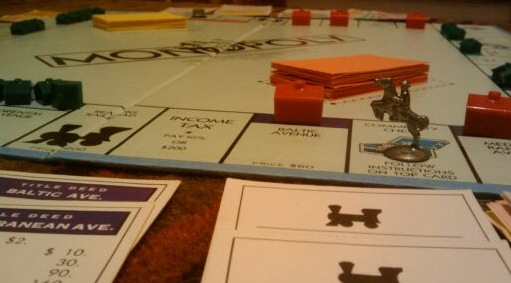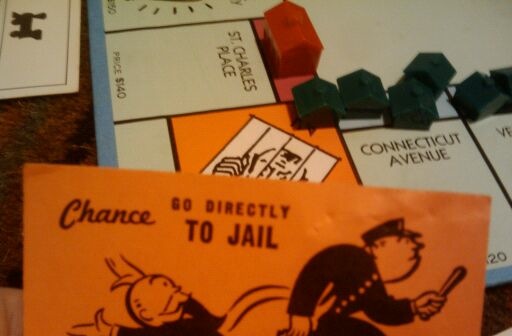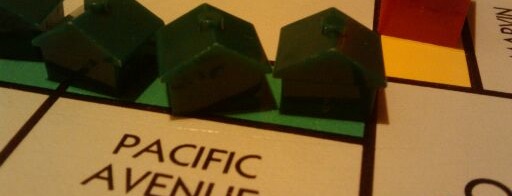Monopoly: The 4 Things You Need to Know
In elementary school, Monopoly was that game the older kids played but you didn’t fully understand. Then after growing up a little you were old enough to lose miserably. Finally after a few more years, or so, you were old enough to understand the game a bit better, and be completely frustrated by your dad’s underhanded tactics (which worked flawlessly every time). Today we’re here to tell you how to be an honest winner at Monopoly using unadulterated logic.
4. The Rules Your Family Uses Are Probably Bullshit
So you sit down to play a friendly game of Monopoly with the family. Fine. It’s not the weekend you had in mind, but it’ll be more fun than last week’s yard work extravaganza. Before you start playing, you’ll want to lay down the law with your goofy rule-breaking parents. Let’s debunk some popular house rules.
First, there is no reward for landing on Free Parking. On a related note, there’s no reason to collect the fines or taxes in the center of the board. It’s just not in the rules. Free Parking doesn’t mean “the city pays you to park.”
Other favorites are preventing players from collecting rent while in prison, preventing everybody from buying property on the first trip around the board, and even allowing two players combine property to form a monopoly.
So, what are we saying here? We’re certainly not advising you to protest all house rules automatically. If you think any home-style rule will benefit you, let it slide, or maybe even suggest it as a fun alternative. When you dislike one, point at the rulebook and cite reasons why that rule sucks. And then buy your family’s souls by mortgaging Park Place, because…
3. Orange is the Best Monopoly
Like all good old-school games, you can win Monopoly with math. It turns out that Boardwalk and Park Place aren’t the best return on your investment. Orange is the most lucrative Monopoly you can own, and the reason is simple: Jail.
Between cards from the Chance pile and the “Go to Jail” space, players find themselves in Jail frequently. Tokens that go to Jail won’t ever pass Park Place, Boardwalk, “Go”, and fittingly enough, the Luxury Tax. Overall, your family is traveling the spaces between “Just Visiting” and “Go to Jail” more often than the rest of the board.
With that in mind, Orange is a logical landing spot. The Pink monopoly is too close to the jail space—it’s unlikely that players will roll a three or four—but seven, the most common number, is a Chance space situated right in the middle of the Orange monopoly. Keep that in mind when you sit down to negotiate who’ll wind up with which monopoly.
Red and Yellow are the next most popular, in that order, and Illinois Ave (Red) is the most visited spot on the board. Railroads are a strong investment, but utilities are not. The Light Blue monopoly is also a good investment based on the low cost of adding houses and the “Take a ride on the Reading” card (1).
2. Houses Are an Exact Science
Well done! You’ve acquired a couple of the game’s best monopolies, but don’t get too complacent because you still have to build on them. How does anyone decide where these darn houses go, anyway? When are they worth buying?
There are a couple of neat tricks to help you dominate Monopoly’s housing market. They all involve looking like a magician while your family pays rent through the nose. First, the best return on your money is three houses, not hotels. You can laugh it up while they buy hotels on Boardwalk and relentlessly land on your three-house getup on Illinois.
Second, there are just 32 houses, so you can block your opponents from buying houses by snatching them up yourself. Hotels are also limited. Another excellent reason to buy houses is that your opponent is about seven spaces away (2). It’s worth it to mortgage a lesser property to stick someone with a massive rent while they’re on their way to jail.
And remember, if you don’t ever get adventurous with your building…
1. Monopoly Lasts Forever
As much as it seems to suck when you get hit with a $1000+ rent right before the all-important “Go” salary, there is no other way for Monopoly to end. We’re sure you know that, but let’s look at some numbers concerning Monopoly’s length, shall we?
The longest game of Monopoly lasted 70 straight days, according to Hasbro (3). That’s the nature of a game with no time limits and no concerns about your well-being. Oh, and that’s not an isolated incident. Wikipedia says Hasbro’s official tournaments are limited to two hours because the game so frequently takes too darn long. Initially, Hasbro was concerned about marketing a game that took longer than 45 minutes.
Thankfully we’ve already given you the advice on how to overcome this one. Many of the house rules that postpone buying property, impede rent collection, or award easy money make Monopoly last longer. If you use the right monopolies and knowledge of the housing system, you can quickly subdue all but the luckiest foes. Take care of business and you should have your family asking for a rematch within an hour.

"Monopoly: The 4 Things You Need to Know" by John Parry is licensed under a Creative Commons Attribution-NonCommercial-NoDerivs 3.0 Unported License.
Sources
1. Collins, Truman. “Probabilities in the Game of Monopoly.” Truman Collins. 4 May
1997. Web. 22 June 2012.
2. Jonathan. “How to Kick Ass in Monopoly (Tips & Strategy).” Zippy Gamer. 15
January 2010. Web. 20 June 2012.
3. “Monopoly History & Fun Facts.” Hasbro. Web. 22 June 2012.








